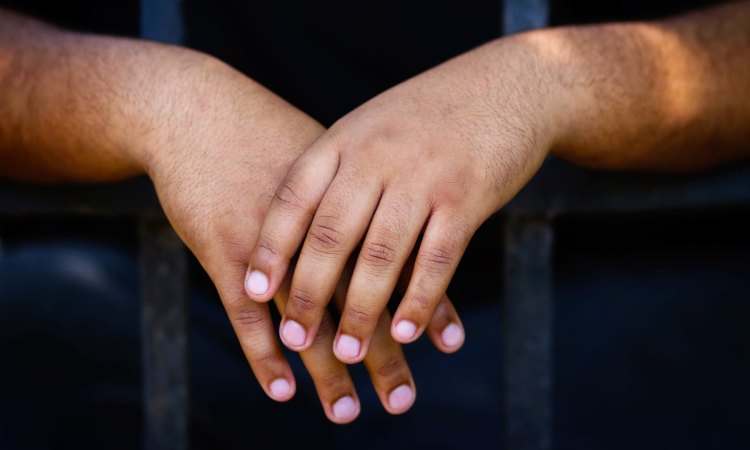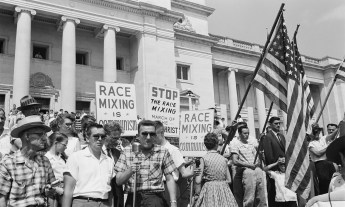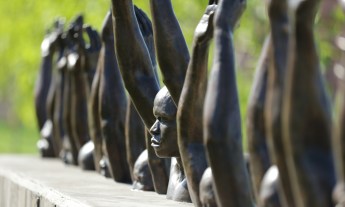
In 1989, children younger than 16 could be sentenced to die in the United States. Lawyer Bryan Stevenson (TED Talk: We need to talk about an injustice) represented some of these juveniles in Alabama, the state with the most children sentenced to death per capita. Read his chilling account of meeting Charlie, a 14-year-old tried as an adult for capital murder, in an excerpt from his new book: Just Mercy: A Story of Justice and Redemption.
“He’s just a little boy.”
It was late, and I had picked up the phone after hours because no one else was in the building; it was becoming a bad habit. The older woman on the other end of the line was pleading with me after offering a heartfelt description of her grandson, who had just been jailed for murder.
Charlie was fourteen years old. He weighed less than 100 pounds and was just five feet tall.
“He’s already been in the jail for two nights, and I can’t get to him. I’m in Virginia, and my health is not good. Please tell me you’ll do something.”
I hesitated before answering her. Only a handful of countries permitted the death penalty for children — and the United States was one of them. Many of my Alabama clients were on death row for crimes they were accused of committing when they were sixteen- or seventeen-year-old children. Many states had changed their laws to make it easier to prosecute children as adults, and my clients were getting younger and younger. Alabama had more juveniles sentenced to death per capita than any other state—or any other country in the world. I was determined to manage the growing demand for our services by taking on new cases only if the client was facing execution or formally condemned to death row.
This woman had told me that her grandson was only fourteen. While the Supreme Court had upheld the death penalty for juveniles in a 1989 ruling, a year earlier the Court had barred the death penalty for children under the age of fifteen. Whatever perils this child faced, he was not going to be sent to death row. This lady’s grandson might be facing life imprisonment without parole, but given the overwhelming number of death penalty cases on our docket, I couldn’t rationalize taking on his case.
As I considered how to answer this woman’s plea, she started speaking quickly, at a whisper: “Lord, please help us. Lead this man and protect us from any choice that is not yours. Help me find the words, Lord. Tell me what to say, Lord—”
I didn’t want to interrupt her prayer, so I waited until she finished. “Ma’am, I can’t take the case, but I will drive down to the jail and see your grandson tomorrow. I’ll see what I can do. We likely won’t be able to represent him, but let me find out what’s going on, and perhaps we can help you find a lawyer who can assist you.”
“Mr. Stevenson, I’m so grateful.” I was tired and already feeling overwhelmed with the cases I had. And cases with juveniles took an especially severe emotional toll on everyone who touched them. But I needed to go to a courthouse near the county where this boy was being held, so it wouldn’t be that big a deal to stop by and see the child.
The next morning I drove for over an hour to the county. When I got to the courthouse, I checked the clerk’s file on the case and found a lengthy incident report. Because I was an attorney investigating the case on behalf of the family, the clerk let me read the file, although she wouldn’t make a copy or let me take it out of the office because it involved a minor. The clerk’s office was small, but it wasn’t especially busy, so I sat down on an uncomfortable metal chair in a cramped corner of the room to read the statement, which mostly confirmed everything the grandmother had told me.
Charlie had, by his own account, shot and killed his mother’s boyfriend — a man named George.
Charlie was fourteen years old. He weighed less than 100 pounds and was just five feet tall. He didn’t have any juvenile criminal history— no prior arrests, no misconduct in school, no delinquencies or prior court appearances. He was a good student who had earned several certificates for perfect attendance at his school. His mother described him as a “great kid” who always did what she asked. But Charlie had, by his own account, shot and killed a man named George.
George was Charlie’s mother’s boyfriend. She referred to their relationship as a “mistake.” George would often come home drunk and begin acting violently. There were three occasions in the year and a half leading up to the night of the shooting when George beat Charlie’s mother so mercilessly that she required medical treatment. She never left George or made him leave, even though she told several people that she knew she should.
On the night of the shooting, George had come home very drunk. Charlie and his mother were playing cards when he arrived. He entered the house shouting, “Hey, where are you?” Charlie’s mother followed his voice to the kitchen, where she let him know that she and Charlie were home playing cards. The two adults had argued earlier in the evening because she had begged him not to go out, fearing that he would come home drunk. Now she looked at him angrily when she saw him standing there, reeking of alcohol. He looked back at her, mirroring her contempt and disgust, and in a flash, he punched her hard in the face. She didn’t expect him to hit her so quickly or violently—he hadn’t done it like that before. She collapsed to the floor with the crush of his blow.
Charlie was standing behind his mother and saw her head slam against their metal kitchen counter as she fell. George saw Charlie standing there and glared at him coldly before brushing past him toward the bedroom, where Charlie heard him fall noisily onto the bed. Charlie’s mother was lying on the floor, unconscious and bleeding badly. He knelt by his mother’s side and tried to stop the bleeding.
There was some blood on her face, but it poured from an ugly cut on the back of her head. Charlie tried feverishly to revive her. He started crying, futilely asking his mother what to do. He got up and put paper towels behind her head but couldn’t stop the bleeding. He frantically searched for the cloth kitchen towel because he thought that would work better and found it wrapped around a pot on the stove. His mother had cooked black-eyed peas for dinner; he loved black-eyed peas. They’d eaten together before they’d started playing pinochle, his favorite card game.
Charlie replaced the paper towels with the cloth towel and panicked all over again when he saw how much blood there was. He was quietly begging his mother to wake up when it appeared to him that she wasn’t breathing. He thought he should call an ambulance, but the phone was in the bedroom with George. George had never hit Charlie, but he terrified him just the same. As a younger child, whenever Charlie got very scared or anxious, he would sometimes start trembling and shaking. The shaking would almost always be followed by a nosebleed.
Sitting on the kitchen floor with his mother’s blood all around him, Charlie could feel himself starting to tremble, and within seconds the blood slowly began to trickle out of his nose. His mother would always run to get something to help with his nosebleeds, but now she just lay on the floor. He wiped the blood from his nose and focused on the fact that he had to do something. His trembling stopped. His mother hadn’t moved in nearly fifteen minutes. The house was quiet. The only sound he heard was George breathing heavily in the other room; soon he could hear him snoring.
Charlie had been slowly stroking his mother’s hair, desperately hoping that she would open her eyes. The blood from her head had saturated the towel and was spreading onto Charlie’s pants. Charlie thought his mother might be dying or was maybe even already dead. He had to call an ambulance. He stood up, flooded with anxiety, and cautiously made his way to the bedroom. Charlie saw George on the bed asleep and felt a surge of hatred for this man. He had never liked him, never understood why his mother had let him live with them. George didn’t like Charlie, either; he was rarely friendly to the boy. Even when he wasn’t drunk, George seemed angry all the time. His mother had told Charlie that George could be sweet, but Charlie never saw any of that. Charlie knew that George’s first wife and child had been killed in a car accident and that was why Charlie’s mom said he drank so much. In the eighteen months that George lived with them, it seemed to Charlie that there had been nothing but violence, loud arguments, pushing and shoving, threats, and turmoil. His mother had stopped smiling the way she used to; she’d become nervous and jumpy, and now, he thought, she’s on the kitchen floor, dead.
Charlie walked to the dresser against the back wall of the bedroom to reach the phone. He had called 911 a year earlier, after George had hit his mom, but she had directed him to do so and told him what to say. When he reached the phone, he wasn’t sure why he didn’t just pick up the receiver. He could never really explain why he opened the dresser drawer instead, put his hand under the folded white T-shirts his mom had laundered, and felt for the handgun he knew George kept hidden there. He’d found it there when George had said Charlie could wear an Auburn University T-shirt someone had given him. It was way too small for George and way too big for Charlie, but he’d been grateful to have it; it had been one of George’s few kind gestures. This time he didn’t pull his hand back in fear as he had before. He picked up the gun. He’d never fired a gun before, but he knew he could do it.
George was now snoring rhythmically.
Charlie walked over to the bed, his arms stretched out, pointing the gun at George’s head. As Charlie hovered over him, the snoring stopped. The room grew very, very quiet. And that’s when Charlie pulled the trigger.
Then I discovered that George was a local police officer.
The sound of the bullet firing was much louder than Charlie had expected. The gun jerked and pushed Charlie a step back; he almost lost his balance and fell. He looked at George and squeezed his eyes closed; it was horrible. He could feel himself starting to tremble again, and that’s when he heard his mother moaning in the kitchen. He couldn’t believe she was alive. He ran back to the phone and called 911, then sat next to his mother until the police arrived.
After learning all of this, I was positive they would not prosecute Charlie as an adult. I continued to read the file and the notes from the initial court appearance. The prosecutor did not dispute the account that Charlie and his mother had given. It was only when I continued reading that I discovered that George was a local police officer. The prosecutor made a long argument about what a great man George had been and how upsetting his death had been for everyone in the community. “George was a law enforcement officer who served with honor,” the prosecutor argued. “It is a great loss for the county and a tragedy that a good person could be so heartlessly killed by this young man.” The prosecutor insisted that Charlie be tried as an adult, and he announced that he intended to seek the maximum punishment permitted by law. The judge agreed that this was capital murder and that the boy should be tried as an adult. Charlie was immediately taken to the county jail for adults.
The small county jail was across the street from the courthouse. Like many Southern communities, the courthouse anchored the square that marked the town center. I stepped outside and walked across the street to the jail to see this young man. The jailers clearly didn’t receive a lot of out-of-town lawyers for legal visits. The deputy on duty looked at me suspiciously before taking me into the jail, where I sat in the small attorney meeting room waiting for Charlie. From the time I finished reading the file, I couldn’t stop thinking about how tragic this case was—and my somber thoughts weren’t interrupted until a small child was pushed into the visiting room. This boy seemed way too short, way too thin, and way too scared to be fourteen. I looked at the jailer, who seemed to share my surprise at how small and terrified the child appeared. I asked them to remove the handcuffs. Sometimes in jails like this, the guards resist uncuffing clients, arguing that it’s not safe or permitted to take the handcuffs off a suspect during a legal visit. They worry that if a person gets upset or becomes violent, being uncuffed will make him or her harder to subdue.
This guard didn’t hesitate to take the handcuffs off this child before leaving the room.
We were sitting at a wooden table that was probably four by six feet. Charlie was on one side of the table, and I was on the other. It had been three days since his arrest.
“Charlie, my name is Bryan. Your grandmother called me and asked me if I would come and see you. I’m a lawyer, and I help people who get in trouble or who are accused of crimes, and I’d like to help you.”
The boy wouldn’t make eye contact with me. He was tiny, but he had big, beautiful eyes. He had a close haircut that was common for little boys because it required no maintenance. It made him look even younger than he was. I thought I saw tattoos or symbols on his neck, but when I looked more closely, I realized that they were bruises.
“Charlie, are you okay?”
He was staring intensely to my left, looking at the wall as if he saw something there. His distant look was so alarming that I actually turned to see if there was something of interest behind me, but it was just a blank wall. The disconnected look, the sadness in his face, and his complete lack of engagement—qualities he shared with a lot of the other teenagers I’d worked with—were the only things that made me believe he was fourteen. I sat and waited for a very long time in the hope that he would give me some kind of response, but the room remained silent. He stared at the wall and then looked down at his own wrists. He wrapped his right hand around his left wrist where the handcuffs had been and rubbed the spot where the metal had pinched him.
“Charlie, I want to make sure you’re doing okay, so I just need you to answer a few questions for me, okay?” I knew he could hear me; whenever I spoke, he would lift his head and return his gaze to the spot on the wall.
“Charlie, if I were you, I’d be pretty scared and really worried right now, but I’d also want someone to help me. I’d like to help, okay?” I waited for a response, but none was forthcoming.
“Charlie, can you speak? Are you okay?” He stared at the wall when I spoke and then back at his wrists when I was finished, but he didn’t say a word.
“We don’t have to talk about George. We don’t have to talk about what happened; we can talk about whatever you want. Is there something you want to talk about?” I was waiting for longer and longer stretches after each question, desperately hoping that he would say something, but he didn’t.
“Do you want to talk about your mom? She’s going to be fine. I’ve checked, and even though she can’t visit you, she’s going to be fine. She’s worried about you.”
I thought talking about his mother would spark something in Charlie’s eyes. When it didn’t, I became even more concerned about the child.
I noticed that there was a second chair on Charlie’s side of the table, and I realized that lawyers were apparently supposed to sit on that side and the clients on the side I chose, where there was only one chair. I’d sat in the wrong place.
I lowered my voice and spoke more softly, “Charlie, you’ve got to talk to me. I can’t help you if you don’t. Would you just say your name—say something, please?” He continued to stare at the wall. I waited and then stood up and walked around the table. He didn’t look at me as I moved but returned his gaze to his wrist. I sat in the chair next to him, leaned close, and said quietly, “Charlie, I’m really sorry if you’re upset, but please talk to me. I can’t help you if you don’t talk to me.” He leaned back in his chair for the first time, nearly placing his head on the wall behind us. I pulled my chair closer to him and leaned back in mine. We sat silently for a long time and then I started saying silly things, because I didn’t know what else to do.
“Well, you won’t tell me what you’re thinking, so I guess I’m going to just have to tell you what I’m thinking. I bet you think you know what I’m thinking,” I said playfully, “but in fact you really couldn’t possibly imagine. You probably think I’m thinking about the law, or the judge, or the police, or why won’t this young man speak with me. But what I’m actually thinking about is food. Yes, that’s right, Charlie,” I continued teasingly, “I’m thinking about fried chicken and collard greens cooked with turkey meat and sweet potato biscuits. . . . You ever had a sweet potato biscuit?”
Nothing.
“You’ve probably never had a sweet potato biscuit, and that’s a shame.”
Still nothing. I kept going.
“I’m thinking about getting a new car because my car is so old.” I waited. Nothing. “Charlie, you’re supposed to say, ‘How old is it, Bryan?’ and then I say my car is so old—”
He never smiled or responded; he just continued looking at the spot on the wall, his face frozen in sadness.
“What kind of car do you think I should get?” I went through a range of ridiculous musings that yielded nothing from Charlie. He continued to lean back, and his body seemed a little less tense. I noticed that our shoulders were now touching.
After a while I tried again. “Come on, Charlie, what’s going on? You’ve got to talk to me, son.” I started leaning on him somewhat playfully, until he sat forward a bit, and then I finally felt him lean back into me. I took a chance and put my arm around him, and he immediately began to shake. His trembling intensified before he finally leaned completely into me and started crying. I put my head to his and said, “It’s okay, it’s all right.” He was sobbing when he finally spoke. It didn’t take me long to realize that he wasn’t talking about what had happened with George or with his mom but about what had happened at the jail.
“There were three men who hurt me on the first night. They touched me and made me do things.” Tears were streaming down his face.
“There were three men who hurt me on the first night. They touched me and made me do things.” Tears were streaming down his face. His voice was high-pitched and strained with anguish.
“They came back the next night and hurt me a lot,” he said, becoming more hysterical with each word. Then he looked in my face for the first time.
“There were so many last night. I don’t know how many there were, but they hurt me . . . .”
He was crying too hard to finish his sentence. He gripped my jacket with a force I wouldn’t have imagined he was capable of exerting.
I held him and told him as gently as I could, “It’s going to be okay. It’s going to be okay.” I’d never held anyone who gripped me as tightly as that child or who cried as hard or as long. It seemed like his tears would never end. He would tire and then start again. I just decided to hold him until he stopped. It was almost an hour before he calmed down and the crying stopped. I promised him that I would try to get him out of there right away. He begged me not to leave, but I assured him that I would be back that day. We never talked about the crime.
When I left the jail, I was more angry than sad. I kept asking myself, “Who is responsible for this? How could we ever allow this?” I went directly to the sheriff ’s office inside the jail and explained to the overweight, middle-aged sheriff what the child had told me, and I insisted that they immediately place him in a protected single cell. The sheriff listened with a distracted look on his face, but when I said I was going to see the judge, he agreed to move the child into a protected area immediately. I then went back across the street to the courthouse and found the judge, who called the prosecutor. When the prosecutor arrived in the judge’s chambers, I told them that the child had been sexually abused and raped. They agreed to move him to a nearby juvenile facility within the next several hours.
I decided to take on the case. We ultimately got Charlie’s case transferred to juvenile court, where the shooting was adjudicated as a juvenile offense. That meant Charlie wouldn’t be sent to an adult prison, and he would likely be released before he turned eighteen, in just a few years. I visited Charlie regularly, and in time he recovered. He was a smart, sensitive child who was tormented by what he’d done and what he’d been through.
At a talk I gave at a church months later, I spoke about Charlie and the plight of incarcerated children. Afterward, an older married couple approached me and insisted that they had to help Charlie. I tried to dissuade these kind people from thinking they could do anything, but I gave them my card and told them they could call me. I didn’t expect to hear from them, but within days they called, and they were persistent. We eventually agreed that they would write a letter to Charlie and send it to me to pass on to him. When I received the letter weeks later, I read it. It was remarkable.
Mr. and Mrs. Jennings were a white couple in their mid-seventies from a small community northeast of Birmingham. They were kind and generous people who were active in their local United Methodist church. They never missed a Sunday service and were especially drawn to children in crisis. They spoke softly and always seemed to be smiling but never appeared to be anything less than completely genuine and compassionate. They were affectionate with each other in a way that was endearing, frequently holding hands and leaning into each other. They dressed like farmers and owned ten acres of land, where they grew vegetables and lived simply. Their one and only grandchild, whom they had helped raise, had committed suicide when he was a teenager, and they had never stopped grieving for him. Their grandson struggled with mental health problems during his short life, but he was a smart kid and they had been putting money away to send him to college. They explained in their letter that they wanted to use the money they’d saved for their grandson to help Charlie.
Eventually, Charlie and this couple began corresponding with one another, building up to the day when the Jenningses met Charlie at the juvenile detention facility. They later told me that they “loved him instantly.” Charlie’s grandmother had died a few months after she first called me, and his mother was still struggling after the tragedy of the shooting and Charlie’s incarceration. Charlie had been apprehensive about meeting with the Jenningses because he thought they wouldn’t like him, but he told me after they left how much they seemed to care about him and how comforting that was. The Jenningses became his family.
At one point early on, I tried to caution them against expecting too much from Charlie after his release. “You know, he’s been through a lot. I’m not sure he can just carry on as if nothing has ever happened. I want you to understand he may not be able to do everything you’d like him to do.”
They never accepted my warnings. Mrs. Jennings was rarely disagreeable or argumentative, but I had learned that she would grunt when someone said something she didn’t completely accept. She told me, “We’ve all been through a lot, Bryan, all of us. I know that some have been through more than others. But if we don’t expect more from each other, hope better for one another, and recover from the hurt we experience, we are surely doomed.”
The Jenningses helped Charlie get his general equivalency degree in detention and insisted on financing his college education. They were there, along with his mother, to take him home when he was released.
This excerpt is adapted with permission from Just Mercy: A Story of Justice and Redemption by Bryan Stevenson (Spiegel & Grau). Watch his TED Talk: We need to talk about an injustice.
[ted id=1378]
Featured image via iStockphoto.











